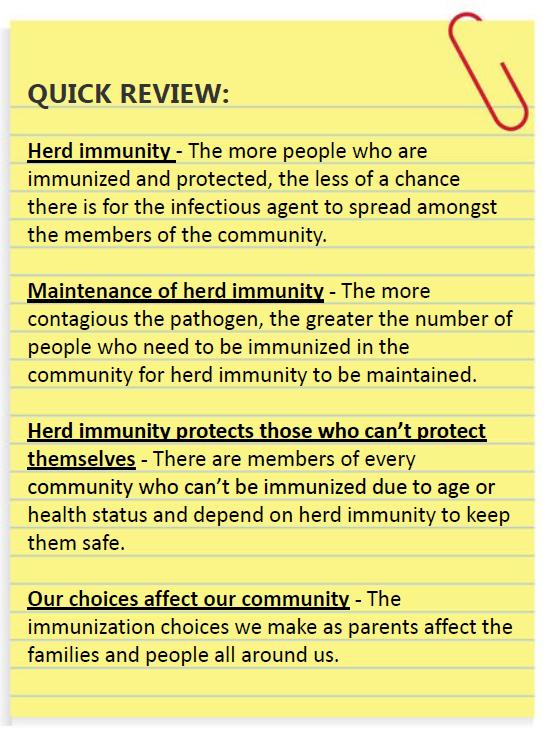In the fourth installment of the Immunology 101 Series, Aimee will define and explain the importance of herd immunity.
While watching the news or reading the newspaper the last few weeks, you may have heard that there have been a record high number of cases of whooping cough (pertussis) in Boulder, CO, and measles in England. As parents, this news is worrisome. Our immediate thoughts turn to questions like, ‘Will my child be exposed to either of these illnesses?’ If so, ‘What are the chances that s/he will become infected?’ The answer to these questions lies not only in the choices we make as parents but also in the choices those around us make for their children and families. The term we use to describe the immunization choices made within the community is ‘herd immunity.’
What is herd immunity?
Herd immunity, also called ‘community immunity’, is a concept that if most of the people in a community have been immunized and are protected from an infectious agent, the chance of a susceptible (i.e. unimmunized) individual contacting an infected individual is so low that the susceptible person is not likely to become infected. Basically, the more people who are immunized and protected, the less chance there is for the disease to spread amongst the members of the community.
The maintenance of herd immunity is dependent upon the majority of individuals in the community being vaccinated. This is key. In order for those who are vaccinated to protect those who are not vaccinated, a majority of people in the community need to be vaccinated. In addition, the percentage of people who need to be vaccinated to maintain herd immunity varies according to the pathogen (i.e. a bacterium or virus), as some pathogens are more contagious than others. For example, measles is highly contagious. In order for herd immunity to work for measles, ~95% of the community needs to be vaccinated against measles. The same numbers hold true for whooping cough (pertussis). Community immunity needs to be quite high to protect all individuals in the community from measles and pertussis. Check out this herd immunity animation at the History of Vaccines website to see how it works.
Why is herd immunity important?
Creating and maintaining herd immunity is especially important because there are members of every community who can’t be immunized — such as infants too young for particular vaccines and individuals who are immunocompromised — and depend on herd immunity to keep them safe. Immunocompromised members of the community, or people with a weak or malfunctioning immune system, include transplant patients, people who are HIV+, people undergoing chemotherapy, and people who have problems with their immune system (i.e. they are immunodeficient). There are also certain vaccines that can’t be given to pregnant women. As a result, these members of the community rely on the protection of the ‘herd’ to keep them safe.
Our choices affect more than just our families.
It is absolutely essential that we, the members of our community, understand that the choices we make as parents regarding vaccination affect the families – infants, children, parents, grandparents – and people – friends, neighbors, colleagues – all around us. We are all connected in this globetrotting, highly mobile, social society. It is a mistake to think that choosing not to vaccinate is a risk-free choice.
Choosing not to vaccinate is the choice to risk contracting a vaccine-preventable disease. It is the choice to miss work or school if you or one of your loved ones becomes ill with a vaccine-preventable disease. It is the choice to put yourself and/or your family members and those around you at risk for a vaccine-preventable disease. Even worse, it may result in a much more tragic event – a choice that could result in the suffering or even death of a vulnerable member of your family or community.
We all have a common goal – to keep children and adults healthy.
Something that scientists and physicians know, but seems to have been lost in translation over the last few decades, is that all of our current vaccines on the American Academy of Pediatrics immunization schedule were created to protect us from the diseases that cause the most harm and often result in death. People like us who live in developed countries have been fortunate enough not to see the results of these devastating diseases firsthand. Why? The answer is quite simple – vaccines work. Because vaccines work, and have been working for decades, we haven’t seen the devastating effects of the diseases they prevent here in the U.S. Most parents with young children are too young to have seen the devastation and loss of life caused by horrific diseases such polio and smallpox. Thanks to vaccines, these diseases have been nearly wiped out or no longer exist in the U.S.
Ironically, there are some people within our community who see this bit of information as reason to think there is no need to vaccinate their children. But what about the family in your child’s kindergarten class that traveled to Europe over the holidays? Or the neighbor who just visited several cities in Asia while on a business trip last week? When making decisions for your family regarding vaccination, remember that we are all connected in this increasingly global society; vaccine-preventable diseases are literally just a plane ride away. The choices we make as parents regarding vaccination affect not only our loved ones but all the families and people around us.

